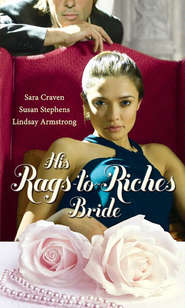По всем вопросам обращайтесь на: info@litportal.ru
(©) 2003-2024.
✖
Greek Affairs: The Virgin's Seduction: The Virgin's Wedding Night / Kyriakis's Innocent Mistress / The Ruthless Greek's Virgin Princess
Автор
Год написания книги
2019
Настройки чтения
Размер шрифта
Высота строк
Поля
‘What I don’t understand,’ she went on, as if he hadn’t spoken, ‘is why you waste a moment of your time on those street portraits. They can’t bring in enough money to pay the bills.’
‘No,’ he said. ‘I look on them mainly as relaxation. It’s good to get out sometimes—to meet new people. Don’t you agree?’
She remembered the entranced face of the girl he’d been sketching outside the Flint Audley offices.
She looked round the big room, deliberately letting her glance linger on the pile of papers that had fallen off the sofa, the remains of a meal left on a table, the unmade bed, only half hidden behind a large folding screen. She said, ‘And is this where you bring—your new friends?’
His tone was laconic as he followed her gaze. ‘It’s the maid’s day off.’
‘Then perhaps you should ask your girlfriend to clear up a little.’ Her response was immediate—tart—and completely unintentional. After all, she’d already made her point.
‘She does not come here for that,’ he said gently. ‘Also, she might spoil her beautiful hands, and I can put them to much better use.’
And no prizes for guessing what he meant, Harriet thought furiously, her face warming all over again in spite of herself. She said stonily, ‘I always understood decent men did not kiss and tell.’
He shrugged, unrepentantly. ‘Who mentioned kissing?’ and laughed softly as her flush deepened.
He glanced over his shoulder as a car horn sounded from the street. ‘And that is your cab, Miss Flint,’ he added with studied politeness. ‘Right on time.’ And stood aside to let her pass.
Harriet found herself clinging to the rail of the metal staircase as she descended, aware that her legs were shaking, and that she was strangely breathless again.
As she crossed the yard, she looked back swiftly, almost furtively, to see if he was watching her go. But the staircase was empty, and the door was closed.
And for one confused, disturbing moment, Harriet did not know whether to be glad or sorry.
CHAPTER THREE
HIS handkerchief was a small, forlorn bundle in the middle of her gleaming ash table.
Harriet’s instinct was to chuck it straight in the kitchen bin, possibly slamming down the lid as a coda, but she had to admit that current evidence suggested he might not have handkerchiefs to spare, and that it would be more gracious to return the damned thing laundered.
That was if she felt gracious.
And at the moment, in the seething maelstrom of her emotions, bewilderment seemed to predominate. Alongside anger.
She sank down into her black kid recliner chair, closing her eyes and allowing her whole body to go limp, while she breathed deeply and evenly, trying to recapture a modicum of calm and sanity.
She could not believe how her life had suddenly changed.
Twenty-four hours ago, she’d looked at the future with a kind of quiet confidence. She’d been about to take the next step up the ladder at Flint Audley, and she’d found a working solution to her grandfather’s autocratic and ill-judged attempt to force her into matrimony.
Like the horse being led to water, she would get married. But not even Gregory Flint could force her to stay married, she’d told herself grimly. That was not part of the deal. Nor had he specified how long this unholy wedlock would have to last. But he could hardly insist she stayed in an unhappy relationship, especially if he believed his ultimatum was the root case of her misery.
Something she’d planned to make bravely and wistfully clear. How she’d been rushed into a terrible mistake.
Or that had been her intention, she thought bitterly.
Her precious, foolproof plan. Now wreckage.
The rung on the corporate ladder. Broken.
Oh, the expansion scheme would go ahead, but possibly not under her direction, however hard she worked on it. And maybe if there was a glass ceiling, Gramps had ordered its installation.
I wouldn’t put it past him, she thought bleakly.
Perhaps she should have succumbed to the inevitable—picked one of the paralysingly dull but worthy young men who’d been regularly trotted out at dinner parties for her inspection. At least she’d have had the prospect of Gracemead as consolation.
But would that have been enough to reconcile her to the reality of marriage? Somehow she doubted it. She valued her independence too highly. Child as she’d been, she could remember only too well her mother’s unavailing attempts to revive relationships that had clearly exceeded their shelf lives.
Maybe it was then that she’d realised the danger of being at the mercy of her hormones, she thought wryly.
And while life could be lonely at times, especially as most of her schoolfriends now seemed to have husbands and, accordingly, other priorities, at least she was at no one’s beck and call when work was over. When her time became her own, along with her personal space.
And her time was now wasting.
She got up, and went into her bedroom, feeling her usual lift of satisfaction as she looked around her. All the furniture was built-in, and concealed behind anonymous doors, so the focal point was the bed. She’d picked the biggest she could find, with the most heavenly mattress, and dressed the whole thing in ivory linen, with olive green cushions adding the only colour note, one which she’d repeated in the shades of the lamps on the twin night tables flanking the bed.
The bathroom was equally austere in white and chrome, but she hadn’t stinted on the size of the tub, or the walk-in shower, and particularly on the pile of fluffy towels that were always waiting.
She undressed slowly, dropping her clothes into the linen basket, loosened her hair from its constricting band, and stepped under the fierce pelting of the shower, first smothering herself in her favourite scented body wash. How wonderful, she thought, as she turned herself languorously under the warm torrent, if the troubles of the day could be as easily rinsed away as this foam.
She dried herself, and put on a pair of her favourite pyjamas. She had a whole range of them, tailored in satin in cool pastel shades, and obtained from an exclusive mail order source, and tonight’s choice was pale turquoise.
She padded barefoot into her gleaming kitchen, taking a ready-cooked chicken breast from the fridge, preparing a dressing for the accompanying salad, and heating a small baguette. If she wanted dessert, there was always yoghurt.
As she ate, she pondered what she could put in tomorrow’s report for Tony. Nothing, for sure, that would sound like an excuse, or make it sound as if she wasn’t up to the job. She’d believed until today that they had a good working relationship based on mutual respect. Now it seemed as if he’d just been waiting for her to screw up.
Well, she was not so easily to be set aside, she told herself defiantly. She would fight, and fight again, and to hell with glass ceilings.
Because iron had entered her soul that afternoon, when she’d discovered what people really thought about her, and now she no longer merely wanted to take charge of the expansion plans. No, she wouldn’t be content now until she held the position her grandfather had once enjoyed—as chairman of the board.
At which point, they’d be laughing on the other side of their faces.
Her meal ended, she put on some Mozart and set to work, drafting and re-drafting the report for Tony until she was reasonably satisfied. She kept it short and pithy, maintaining the basic value of the scheme, but admitting she’d failed to gauge the level of opposition it might garner. That she felt this had been based on personalities rather than actual reasoning, and that next time she would ensure that opinion was more informed, so that there could be a genuine debate.
Then she printed it off, closed down her laptop, and sat back with a sigh, closing her eyes.
One rock shifted, hopefully, but a massive boulder still to go.
Keeping her job might be one thing. But hanging on to Gracemead was quite another, especially when her grandfather’s deadline was coming nearer by the day.
She supposed she could always try another small ad on one of the dating pages, then recalled with a grimace just how long it had taken to extract Peter from among the welter of total unsuitables who’d responded. None of whom she’d wish to encounter a second time.
Also, she had to be careful. If, by some remote but fatal chance, anyone at work found out or even suspected what she was trying to do, her life would become completely unbearable. And outside work she never met any men. Apart, of course, from today …
She sat up with a jolt, as if several hundred volts of electricity had suddenly passed through her, her mind going into overdrive.
Then stopped, as she remembered contemptuous dark eyes. A voice that dripped scorn. And took a deep breath. No, she thought, that’s nonsensical. That’s carrying the whole thing to the limits of absurdity. Don’t even consider it.













